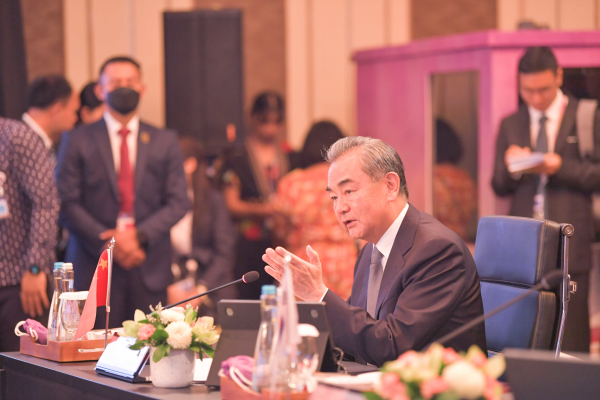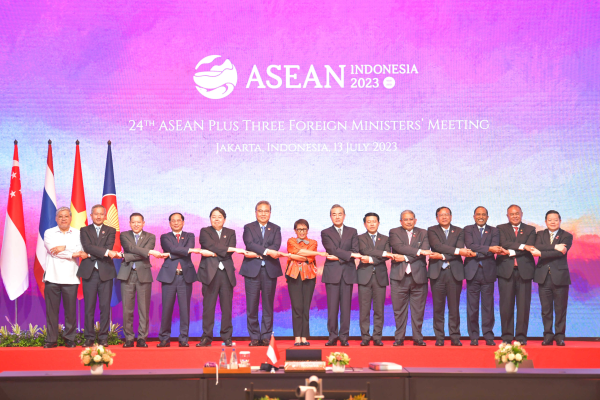
The People’s Republic of China



On July 13, 2023 local time, Director of the Office of the Central Commission for Foreign Affairs Wang Yi attended the ASEAN Plus Three Foreign Ministers' Meeting in Jakarta.
Wang Yi said that the ASEAN Plus Three (APT) cooperation is one of the most mature mechanisms for regional cooperation in East Asia. It has made positive contributions to the prosperity and development of East Asia over the years. Under the current circumstances, APT countries, as major economies in the region, should strengthen solidarity, maintain close cooperation and meet challenges together. First, make every effort to restore regional economic growth. China has provided support for economic and technological cooperation within the Regional Comprehensive Economic Partnership (RCEP) and helped ASEAN countries enhance their abilities to implement RCEP. Second, actively contribute to regional sustainable development. China has provided support for countries in the region with medical supplies, emergency rice reserves and poverty alleviation cooperation. Third, make efforts to resume regional personnel exchanges. Wang Yi called for an increase in commercial flights with countries in the region as soon as possible and an orderly resumption of inbound and outbound tourism.
Wang Yi stressed that this year marks the beginning of implementing the APT Cooperation Work Plan (2023-2027). Countries in the region should grasp the long-term goal of building an East Asia community, support ASEAN centrality, improve the inclusive regional cooperation architecture, and continue to expand cooperation areas, in a bid to inject stronger "East Asia strength" into the recovery and growth of the regional and even world economy. Wang Yi put forward three proposals for APT cooperation in the next stage.
First, adhere to openness and cooperation, and accelerate the process of regional integration. Taking the full entry into force of RCEP as an opportunity, Wang Yi called for supporting Hong Kong's accession to RCEP as one of the first batch of members. China supports the formulation of the APT Economic Cooperation Work Plan and the establishment of a stable, smooth and comparative advantage-based regional industrial and supply chain system. China is willing to promote cooperation among small and medium-sized enterprises and support the ASEAN+3 Macroeconomic Research Office in becoming a regional knowledge hub.
Second, adhere to common security and continuously improve the effectiveness of crisis response. China will continue to donate funds to the APT Emergency Rice Reserve mechanism, strengthen the ASEAN food security information system and better safeguard regional food security. Efforts should be made to enhance the availability and effectiveness of the Chiang Mai Initiative Multilateralization (CMIM) and strengthen the regional financial safety net. The discharge of nuclear-contaminated water from Japan into the ocean bears on the safety of the marine environment and the health of human lives. It is a matter of great importance and thus should not be conducted without thinking twice or authorization, so as to avoid making a gross mistake.
Third, adhere to innovation's leading role and fully tap the potential of sustainable development. Cooperation in emerging industries should be stepped up to add impetus to development. China supports ASEAN's statement on the development of the APT electric vehicle ecosystem and welcomes all parties to participate in the clean energy dialogue, the low-carbon development partnership seminar, the East Asia Forum and other activities hosted by China. China will also continue to promote cooperation in such areas as poverty alleviation, village official exchanges and rural development.
The foreign ministers of Japan, the Republic of Korea and ASEAN countries said that the APT mechanism emerged in response to the crisis and has continued to expand its areas of cooperation, which is becoming increasingly effective. The mechanism has played a key role in helping regional countries to achieve speedy recovery from the COVID-19 pandemic and sustainable development, and has become a solid and reliable anchor of stability. All the parties support an open and inclusive ASEAN-centered regional cooperation architecture, adhere to practicing multilateralism, and maintain regional peace, stability and prosperity. They also agreed that the APT mechanism should keep pace with the times, give full play to the role of the APT Emergency Rice Reserve mechanism, actively push forward the CMIM and promote the high-quality implementation of RCEP. In addition, they agreed to create new growth areas such as digital economy, innovative science and technology, energy transition, and electric vehicles, so as to inject new impetus into regional connectivity and boost resilience as well as help ASEAN become a global growth center.



